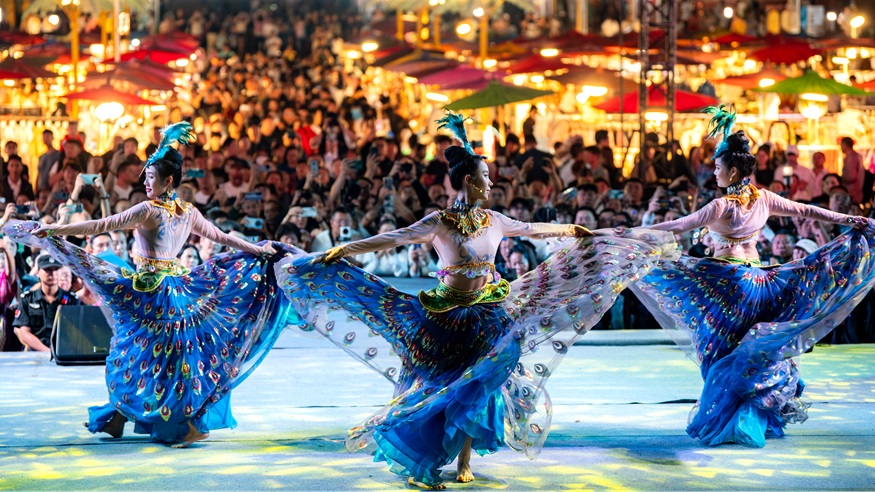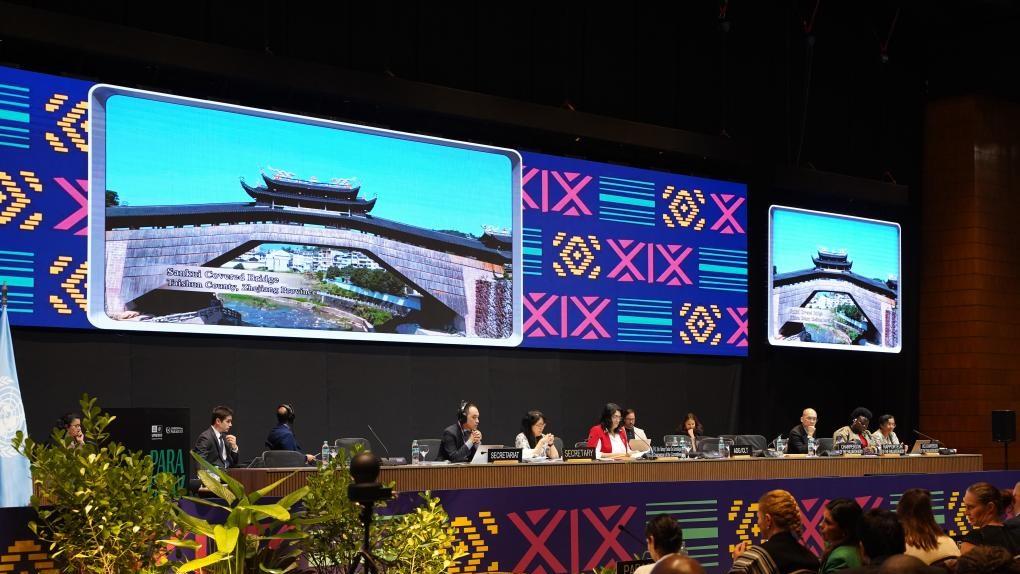Decoding decades of efforts to preserve Qiang New Year festival
CHENGDU, Dec. 9 (Xinhua) -- In celebration of the Qiang New Year festival's inscription on the UNESCO Intangible Cultural Heritage list on Dec. 5, young people from the ancient city of Qiang in Maoxian County, dressed in traditional attire, gathered to perform a vibrant Qiang Salang dance, delighting visitors.
The Qiang people, one of China's oldest ethnic groups, are often regarded as a "living fossil" in the evolutionary history of the Chinese nation. Southwest China's Sichuan Province is home to the country's only Qiang ethnic enclave, where approximately 300,000 Qiang people primarily reside in the Aba Tibetan and Qiang Autonomous Prefecture, and Beichuan Qiang Autonomous County in Mianyang City.
Every year, on the first day of the 10th lunar month, the Qiang people celebrate their most significant traditional festival -- the Qiang New Year. Centered around themes of worshiping heaven and expressing gratitude, they hold ceremonies during the festival to honor the gods, drive away evil, express gratitude for the harvest, and pray for blessings.
The Qiang people are renowned for their talent in singing and dancing, exemplified by the Salang dance, a distinctive circle dance whose name means "sing and dance" in the Qiang language.
"We perform every day, hoping to showcase the authentic charm of our traditions so visitors can experience our warmth and hospitality," said a local Qiang performer in Maoxian County. "We aim to make the ancient Qiang city a window for the world to learn about the Qiang New Year and Qiang culture."
Maoxian County, the largest Qiang enclave in China, is home to 74-year-old Yu Youchen, who has devoted over 20 years to preserving the Qiang New Year tradition. As a provincial-level inheritor of this intangible cultural heritage, Yu has trained three apprentices and gained local recognition for his skillful portrayal of the "Shibi," a key figure in the Qiang New Year celebrations.
"The Qiang New Year celebrations incorporate cultural elements such as Qiang customs, traditions, and dances, providing valuable insights for studying the history and culture of the Qiang people," said Yu, noting that he plans to further refine and pass on the techniques of Shibi performance.
The 8.0-magnitude Wenchuan earthquake in 2008 not only caused the collapse of many Qiang villages and left the community without shelter, but also claimed the lives of key cultural inheritors and ritual hosts of the Qiang New Year. The disaster further destroyed event venues, ceremonial artifacts and historical records, severely impacting the preservation of Qiang culture and the celebration of Qiang New Year.
Also, the declining use of the Qiang language among younger generations has further endangered traditional cultural expressions, with the intergenerational transmission of the Shibi role facing critical challenges. As a result, the survival of the Qiang New Year is at serious risk, making its preservation an urgent priority, according to Geng Jing, director of the Sichuan provincial institute of ethnic studies.
"To safeguard Qiang culture after the earthquake, governments and cultural departments at all levels in China have implemented a series of rescue and reconstruction measures," said Li Jin, a professor at Sichuan University.
A national Qiang cultural ecological protection zone was established, prioritizing the preservation of Qiang culture. Through joint efforts, Qiang New Year was also included in 2009 by UNESCO in the List of Intangible Cultural Heritage in Need of Urgent Safeguarding.
Local communities are now actively encouraged to celebrate the Qiang New Year in accordance with traditional timelines and rituals, preserving the authenticity of the customs. The festival has also been designated a public holiday in Aba Tibetan and Qiang Autonomous Prefecture and Mianyang City, allowing Qiang people the time to joyfully celebrate their heritage.
"Now that the endangered status of Qiang New Year has been alleviated, our goal is to transform it into a platform for the Qiang people to strengthen emotional bonds and convey cultural values," said Li, adding that future efforts will focus on systematic protection, holistic preservation and authentic safeguarding.
Photos
Related Stories
- Digital innovation empowers "China-chic" products to go global
- Letter from China: National archives a new window for understanding Chinese culture
- Book on Chinese social structure, way of life published in Bulgaria
- A glimpse of three Chinese cultural elements newly added to intangible cultural heritage list
- Unraveling the charm of traditional Li textile techniques
Copyright © 2024 People's Daily Online. All Rights Reserved.









